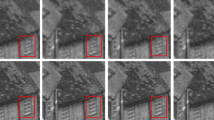Abstract
Super-resolution refers to the process of obtaining a high resolution image from one or more low resolution images. In this work, we present a novel method for the super-resolution problem for the limited case, where only one image of low resolution is given as an input. The proposed method is based on statistical learning for inferring the high frequencies regions which helps to distinguish a high resolution image from a low resolution one. These inferences are obtained from the correlation between regions of low and high resolution that come exclusively from the image to be super-resolved, in term of small neighborhoods. The Markov random fields are used as a model to capture the local statistics of high and low resolution data when they are analyzed at different scales and resolutions. Experimental results show the viability of the method.
Preview
Unable to display preview. Download preview PDF.
Similar content being viewed by others
References
Baker, S., Kanade, T.: Limits on super-resolution and how to break them. IEEE Transactions on PAMI 24(9), 1167–1183 (2002)
Candocia, F.M., Principe, J.C.: Super-resolution of images based on local correlations. IEEE Trans. on Neural Networks 10(2), 372–380 (1999)
Mahesh, B.: Chappalli. Image enhancement using SGW superresolution and iterative blind deconvolution. PhD thesis, The Pennsylvania State University (2005)
Chiang, M.C., Boult, T.E.: Efficient super-resolution via image warping. Image and Vision Computing 18, 761–771 (2000)
Freeman, W.T., Jones, T.R., Pasztor, E.C.: Example-based super-resolution. Computer Graphics and Applications, IEEE 22(2), 56–65 (2002)
Freeman, W.T., Pasztor, E.C., Carmichael, O.T.: Learning low-level vision. International Journal of Computer Vision 20(1), 25–47 (2000)
Geman, S., Geman, D.: Stochastic relaxation, gibbs distributions, and the bayesian restoration of images. IEEE Transactions on PAMI 6, 721–741 (1984)
Hardie, R.C., Barnard, K.J., Armstrong, E.E.: Joint map registration and high- resolution image estimation using a sequence of undersampled images. IEEE Trans. on Image Processing 6(12), 1621–1633 (1997)
Jiji, C.V., Chaudhuri, S.: Single-frame image super-resolution through contourlet learning. EURASIP Journal on Applied Signal Processing (2006)
Kim, S.P., Bose, N.K., Valenzuela, H.M.: Recursive reconstruction of high resolution image from noisy undersampled multiframes. IEEE Trans. on Accoustics, Speech and Signal Processing 18(6), 1013–1027 (1990)
Ni, K.S., Kumar, S., Vasconcelos, N., Nguyen, T.Q.: Single image superresolution based on support vector regression. In: IEEE International Conference on Acoustics, Speech and Signal Processing (2006)
Park, S.C., Park, M.K., Kang, M.G.: Super-resolution image reconstruction: a technical overview. Signal Processing Magazine, IEEE 20(3), 21–36 (2003)
Pearl, J.: Probabilistic Reasoning in Intelligent Systems: Networks of Plausible Inference. Morgan Kaufmann Publishers, Inc, San Francisco (1988)
Su, K., Tian, Q., Xue, Q., Sebe, N., Ma, J.: Neighborhood issue in single-frame image super-resolution. In: IEEE International Conference on Multimedia and Expo, ICME (July 2005)
Tsai, R.Y., Huang, T.S.: Multiframe image restoration and registration. Advances in Computer Vision and Image Processsing, 317–339 (1984)
Weiss, Y.: Belief propagation and revision in networks with loops. Technical report, Berkeley Computer Science Dept. (1998)
Author information
Authors and Affiliations
Editor information
Rights and permissions
Copyright information
© 2007 Springer-Verlag Berlin Heidelberg
About this paper
Cite this paper
Torres-Méndez, L.A., Ramírez-Sosa Morán, M.I., Castelán, M. (2007). A Single-Frame Super-Resolution Innovative Approach. In: Gelbukh, A., Kuri Morales, Á.F. (eds) MICAI 2007: Advances in Artificial Intelligence. MICAI 2007. Lecture Notes in Computer Science(), vol 4827. Springer, Berlin, Heidelberg. https://doi.org/10.1007/978-3-540-76631-5_61
Download citation
DOI: https://doi.org/10.1007/978-3-540-76631-5_61
Publisher Name: Springer, Berlin, Heidelberg
Print ISBN: 978-3-540-76630-8
Online ISBN: 978-3-540-76631-5
eBook Packages: Computer ScienceComputer Science (R0)




